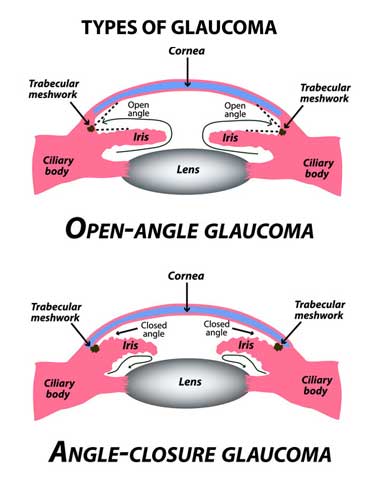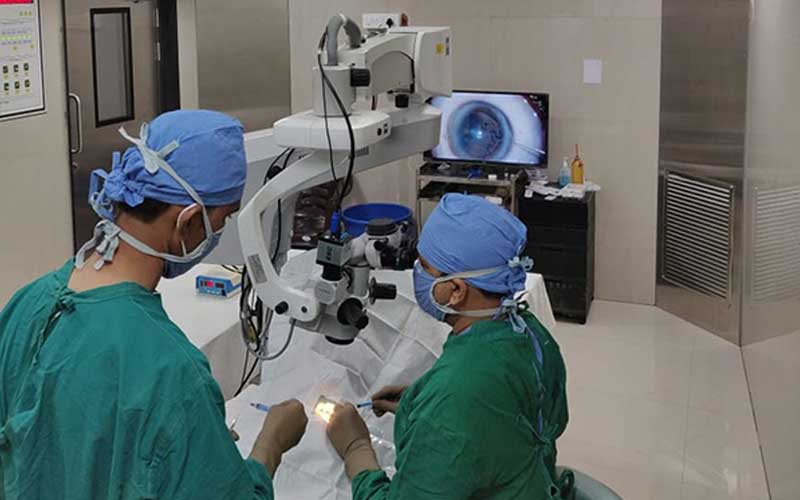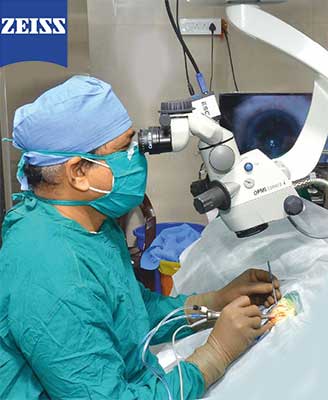
Mon - Fri : 10 am - 1:30 pm & 4 pm - 6:30 pm | Sat : 10 am- 1:30 pm | Sun – Closed
Book Appointment
+91 7720024466
Glaucoma
Glaucoma is an eye condition where raised intra ocular pressure that damages the optic nerve Normally, this optic nerve carries information from the eye to the brain. However, in glaucoma, the nerve is damaged by high eye pressure, causing slow vision loss.
Once vision is lost, it cannot be regained. Luckily, with early detection and treatment, blindness can be prevented. If you are at risk, get your eye pressure tested at least once a year!

Causes & Risk Factors
Normally, your eyes are filled with a watery fluid. This fluid is made in the eyes and it presses against the walls of the eyeball to give it a round shape (Think of the fluid as air filling a balloon).
In healthy eyes, old fluid leaves the eyes as new fluid is produced. But in glaucoma, fluid cannot exit the eye. As the eye makes more fluid, the amount of fluid in the eye increases. This fluid buildup raises eye pressure, which damages the optic nerve.
A few things can increase your risk for glaucoma
Primary Glaucoma
Family history
Short-sight
Long-sight
Ageing
Secondary Glaucoma
Use of corticosteroids (Tablets / inhalers)
Eye Trauma
Diabetes
People above the age of 40 are at risk. It is very common for older people to have glaucoma, but most won’t notice it in the early stages. At later stages, glaucoma is more obvious but less treatable. All adults over the age of 40 or with a family history of glaucoma should get their eyes screened every year.
There are two main types of Glaucoma - Open Angle and Angle Closure
If you have glaucoma, your symptoms will depend on the type
Open Angle
There are very few symptoms in the early stages. Your side (peripheral) vision will slowly get worse.
Angle Closure
You may have sudden, severe symptoms, like :
Dull, aching eye pain
Headache
Eyebrow ache
Halos or colored rings around lights
At later stages, both types may cause symptoms, such as :
Intense eye pain
Eye redness
Watering eyes
Blurry vision & vision loss
If you have sudden changes in vision, see a doctor right away. It may not be glaucoma, but it is important to get it checked.


Childhood Glaucoma
Glaucoma can also occur in new-borns and children who have undergone cataract surgery at an early age.
Signs seen in new-borns are
Large cornea, opacified cornea
Watering of eyes
Child withdraws from light / buries his head to prevent exposure to light
Older children may not show any signs
When to See Your Doctor for an Eye Screening
All adults over the age of 40 should see an eye doctor once a year. Make sure this visit includes an eye pressure test for glaucoma! If you experience sudden pain or changes in vision, see a doctor immediately. Do not wait until your next doctor’s visit.
Yearly screening is important for ALL adults over the age of 40 and anybody with a family history of glaucoma. Don’t wait until it’s too late to save your sight!

Know Your Doctor
Dr. Vijay Magdum
MBBS, DOMS, FCPS (MUMBAI)
Dr. Vijay Magdum is a highly qualified and experienced ophthalmologist with extensive expertise in the field of anterior segment surgery. He holds an MBBS degree and has pursued DOMS at the National Institute of Ophthalmology in Pune, where he received guidance from the esteemed Dr. Shreekant Kelkar. Dr. Magdum has also completed his FCPS from Sir JJ Hospital and Grant Medical College in Mumbai, under the guidance of the renowned Dr. T P Lahane.
With over two decades of experience as a general ophthalmologist, Dr. Magdum is an expert in phaco (cataract surgery), glaucoma treatment, and Lasik surgery. He has a deep understanding of the anterior segment of the eye and is known for his compassionate care and personalized treatment approach. Dr. Magdum's patients appreciate his attention to detail and his ability to explain complex medical procedures in an easy-to-understand manner.

Check what our patients say about us!
Shweta Rakshe
Dr. Vijay Magdum is genius.
I have got My Lasik done by him and the Experience is Life changing for me @ spectacles free life. Doctor made it very smooth and it was a complete painless surgery. All of my questions and concerns were addressed before the surgery and the entire procedure was explained beforehand. The surgery lasted only for 10 mins. The Staff if very helpful and very humble. If you are willing to go for Lasik, be rest assured you are in safe hands at Magdum Hospital.
Eye Treatments We Offer


